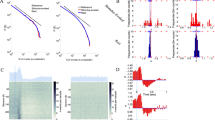Abstract
Experiments probed the dynamic properties of stimulus-evoked (≈10 Hz) oscillations in somatosensory cortex of anesthetized rats. Experimental paradigms and statistical time series analysis were based on theoretical ideas from a dynamic approach to temporal patterns of neuronal activity. From the results of a double-stimulus paradigm we conclude that the neuronal response contains two components with different dynamics and different coupling to the stimulus. Based on this result a quantitative dynamic model is derived, making use of normal form theory for bifurcating vector fields. The variables used are abstract, but measurable, dynamic components. The model parameters capture the dynamic properties of neuronal response and are related to experimental results. A structural interpretation of the model can be given in terms of the collective dynamics of neuronal groups, their mutual interaction, and their coupling to peripheral stimuli. The model predicts the stimulusdependent lifetime of the oscillations as observed in experiment. We show that this prediction relies on the basic concept of dynamic bistability and does not depend on the modeling details.
Similar content being viewed by others
References
Adrian ED (1941) Afferent discharges to the cerebral cortex from peripheral sense organs. J Physiol (Lond) 100:159–191
Aitkin LM, Dunlop CW, Webster WR (1966) Click-evoked response patterns of single units in the medial geniculate body of the cat. J Neurophysiol 29:109–123
Andersen P, Andersson SA (1968) Physiological basis of the alpha rhythm. Appleton-Century-Crofts, New York
Basar E (ed) (1980) EEG-brain dynamics. Relation between EEG and brain evoked potentials. Elsevier/North-Holland, Amsterdam
Basar E, Basar-Eroglu C, Parnefjord R, Rahn E, Schürmann M (1992) Evoked potentials: ensembles of brain induced rhythmicities in the alpha, theta and gamma ranges. In: Basar E, Bullock TH (eds) Induced rhythms in the brain. Birkhäuser, Berlin, pp 155–181
Bishop GH, O'Leary J (1936) Components of the electric response to the optic cortex of the rabbit. Am J Physiol 117:292–308
Chang H-T (1950) The repetitive discharges of cortico-thalamic reverberating circuit. J Neurophysiol 13:235–257
Connors BW, Gutnick MJ (1990) Intrinsic firing patterns of diverse necortical neurons. Trends Neurosci 13:99–104
Dinse HR, Krüger K, Best J (1990) A temporal structure of cortical information processing. Concepts Neurosci 1:199–238
Fleming TC, Evarts EV (1959) Multiple response to photic stimulation in cats. Am J Physiol 197:1233–1236
Ganz L, Felder R (1984) Mechanism of directional selectivity in simple neurons of the cat's visual cortex analyzed with stationary flash sequences. J Neurophysiol 51:294–324
Gardiner CW (1983) Handbook of stochastic methods. Springer, Berlin Heidelberg New York, pp 132–142
Guckenheimer J, Holmes P (1983) Nonlinear oscillations, dynamical systems, and bifurcations of vector fields. Springer, Berlin Heidelberg New York, pp 358–360
Horsthemke W, Lefever R (1984) Noise-induced transitions. Springer, Berlin Heidelberg New York
Llinás R, Sasaki K (1989) The functional organization of the olivocerebellar system as examined by multiple purkinje cell recordings. Eur J Neurosci 1:587–602
MacPherson JM, Aldridge JW (1979) A quantitative method of computer analysis of spike train data collected from behaving animals. Brain Res 175:183–187
Movshon JA, Thompson ID, Tolhurst DJ (1978) Receptive field organization of complex cells in the cat's striate cortex. J Physiol (Lond) 283:79–99
Nakamura K, Mikami A, Kubota K (1991) Unique oscillatory activity related to visual processing in the temporal pole of monkeys. Neurosci Res 12:293–299
Richmond BJ, Optican LM, Spitzer H (1990) Temporal encoding of two-dimensional patterns by single units in primate primary visual cortex. I. Stimulus-response relations. J Neurophysiol 64:351–369
Schöner G, Kelso JAS (1988) Dynamic patterns generation in behavioral and neural systems. Science 239:1513–1520
Schöner G, Kopecz K, Spengler F, Dinse HR (1992) Evoked oscillatory cortical responses are dynamically coupled to peripheral stimuli. NeuroReport 3:579–582
Silva LR, Amitai Y, Connors BW (1991) Intrinsic oscillations of neocortex generated by layer 5 pyramidal neurons. Science 251:432–435
Steriade M, Llinás RR (1988) The functional state of the thalamus and the associated neuronal interplay. Physiol Rev 68:649–742
Steriade M, Gloor P, Llinás RR, Lopes da Silva FH, Mesulam M-M (1990) Basic mechanisms of cerebral rhythmic activities. Electroencephalogr Clin Neurophysiol 76:481–508
Author information
Authors and Affiliations
Rights and permissions
About this article
Cite this article
Kopecz, K., Schöner, G., Spengler, F. et al. Dynamic properties of cortical evoked (10 Hz) oscillations: theory and experiment. Biol. Cybern. 69, 463–473 (1993). https://doi.org/10.1007/BF01185418
Received:
Accepted:
Issue Date:
DOI: https://doi.org/10.1007/BF01185418




